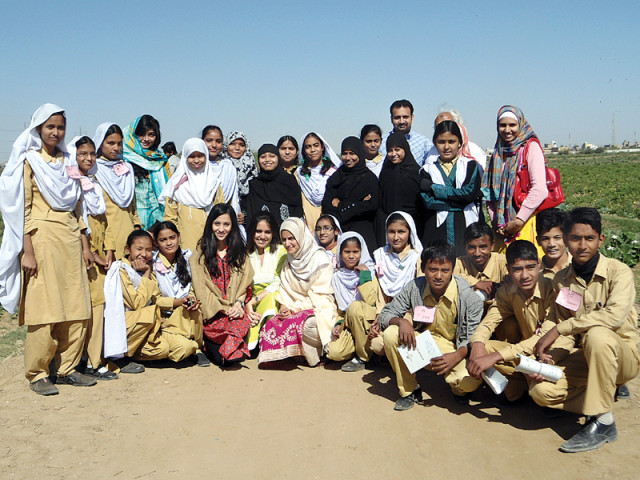Field of dreams
The Citizen Foundation’s Rahbar is mentorship programme that aims at development of Pakistan’s youth on many...

Field of dreams
As odd as that may sound, what’s even odder is that it came as I saw a corporate banker jump over a mound, followed by a gaggle of giggling students in matching beige uniforms.
This was the moment when I got my first glimpse of the mentor-mentee relationship that forms the basis of The Citizen Foundation’s Rahbar programme.
Started in 2008, Rahbar is a mentorship programme that aims at the development of Pakistan’s youth on many levels. It’s come a long way since its humble beginnings and now includes over 1,000 volunteer mentors who have reached out to about 4,500 students in different cities.
The meaning of its slogan “soch say taqdeek tak” (from thought to action) was explained to me by an enthusiastic eight-grade student. “It means that you first convert a positive thought into a positive action, and then turn that action into a habit. That habit then becomes part of your character and can change your life! Understand?”
But beyond the slogans, how does it really work? Basically, volunteers (mentors) from all walks of life pledge their time to help with character building and career counseling for children (mentees) studying in the eight grade or above with the aim of helping these kids develop into responsible adults.
There are seven weekly sessions in one ‘cycle’. In these sessions, the mentors and mentees get to spend time with one another, and see and experience the often very different worlds they belong to.
The mentees get to see a part of their mentor’s life, which could involve anything from visiting a golf club to attending a pottery session. This not only exposes them to a setting they have never experienced, but is also meant to help them understand that careers outside of the conventional ‘doctors and engineer’ paradigm exist as well. In turn, the mentors end up sitting in a roadside dhaba sipping chai, visiting a factory or just roaming around in agricultural fields. It’s a cliché to use the ‘two worlds meeting’ line, but it seems apt in this case.
“I was initially quite scared because I thought our mentors would be really strict,” says Anum, a student of the eighth grade. “But they treat me like a little sister. I can share even my saddest thoughts with them, cry about it, and still feel all right. They taught me that I can be whoever I choose to be.”
Another student, Ali Arsalan, remarked “My mentors taught me to be positive and to observe. They taught me to how to live, how to not fight with others and how to improve the current conditions of my country.”
As I sat in one of the classrooms of the Coast Guard School campus, I was struck by the contrast between the community outside and the one that was being nurtured inside the school premises. I was quite impressed to see such young minds act in so mature a way and I was even more impressed to see the confidence that radiated from these children, most of whom come from underprivileged backgrounds. And right then, I felt a flicker of hope for the future.
Back amidst the tomatoes, it’s clear that its not just the students who feel a positive change in themselves. Running around in the field and laughing, the mentors looked refreshed and … just plain happy. It almost seemed as if they were more excited about the programme than the students. And you can’t blame them. After a week of work politics, and the general stress that is a part and parcel of the rat race we are all running, being around genuine people, sharing your life with them and receiving baskets of tomatoes and loki as presents, would indeed be a refreshing change.
For Zainab, a frequent volunteer who currently works in Engro, helping the kids is a way of helping herself. “When I look at these children dealing with their problems, it gives me the strength to deal with mine. And their advice to me for my own problems has been … phenomenal. It feels great to get so much love and respect, which is why I keep coming back.”
Zeeshan, another mentor currently working for Citibank, feels the same way. “It feels amazing to be giving something back to society; and when you become a victim of your own problems, these kids give you the energy to deal with everything.”
One of the mentors recalled a student who was always the last one to come to class and always ended up missing assembly. He was fortunate enough to be paired up with a mentor who was the very soul of punctuality, and at the end of the cycle the school principal himself noticed the change. The once-upon-a-time Late Latif was now the first person standing in the assembly line. All it took was a mentor’s guidance and trust to inculcate a habit that could change his character and, eventually, his life.
Zainab also related an example of a girl in her mentees group who was aloof, unfriendly and just plain difficult. On one occasion, while the group was discussing success and failures, she commented that her parents had told her she was going to die soon so such concepts were insignificant to her. Alarmed by this statement, Zainab pressed her and discovered that the girl had hepatitis, and that this was why she was so withdrawn. This revelation led to an outpouring of support from within the group and many of her friends related instances of relatives who had been cured of hepatitis and were living full lives.
Today, that girl is not only healthy but one of the brightest students in her class and almost an entirely different person ... a testament to the good we can do when we extend a helping hand.
Published in The Express Tribune, Sunday Magazine, April 22nd, 2012.



















COMMENTS
Comments are moderated and generally will be posted if they are on-topic and not abusive.
For more information, please see our Comments FAQ